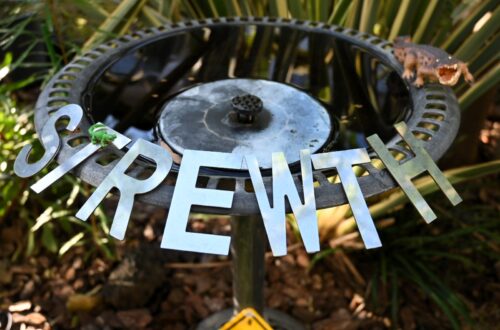lucky country, the Australian English Australia. The term was coined by historian Donald Horne in irony. He argued that Australia was lucky as it became a rich land only because of its natural resources instead of the cleverness or effort shown by other nations. Instead of being shocked by the term, Australians adopted “the Lucky Country” to use as a favorable synonym to describe their land. 日本語 オーストラリアのこと、ラッキーな国。もともと歴史学者ドナルド・ホーン氏が1964年に「ラッキーな国」を皮肉たっぷりに使った表現だ。同氏は、オーストラリアがほかの先進国と違って、知恵や努力で発展したではなく、資源豊富さだけで豊かとなって、とても「ラッキーな国だ」と言った。しかし、多くのオーストラリア人がホーンの本来の意味を無視、今一般に自国名をいい風に表現できる同義語として使うようになった。 Plain English Australia. Strine Dictionary Related posts: Dictionaries and Search Engines/辞書及び検索サイト About Bikkie/クッキー G’day Fairy floss/綿あめ Japanese Government Ministries & Agencies/政府省庁ウェブサイト Croweater/南オーストラリア州出身 Brekkie/朝食 Galah/アホ Larrikin/いたずらっ子 Powered by YARPP.
-
-
larrikin Australian English Somebody mischievous, who does not take life entirely seriously. Used more as a term of endearment as opposed to being critical. 日本語 いたずらっ子。呑気な人。気楽な人、生意気な人。Larrikinは、批判するより温かみを込めている言葉。 Plain English Prankster, trickster, cheeky. Strine Dictionary Related posts: Gobful, give a・怒る Galah/アホ Strine Dictionary Ankle biter/ちびっ子 Der/当り前なこと Dob/告げ口 Fair go/機会 G’day Bikkie/クッキー Fairy floss/綿あめ Powered by YARPP.
-
knock Australian English To criticize, complain, or hold in contempt or ridicule. 日本語 バカにする。文句を言う。批判する。 Plain English 1) Ridicule. 2) Disdain. 3) To tap or deal a blow. Strine Dictionary Related posts: Strine Dictionary Earbashing/口うるさい Grizzle/ぐずる G’day Dinkum, dinky-di, fair dinkum/本物 Gobful, give a・怒る Jackaroo, Jillaroo/オージー版カウボーイ Croweater/南オーストラリア州出身 Barbie/バーベキュー About Powered by YARPP.
-
jackaroo, jillaroo Australian English A jackaroo is a male worker training to become a manager on a large farm called a station in Australia. The jackaroo is Australia’s equivalent to a cowboy. A jillaroo is the name given to women who perform the same job. 日本語 Jackarooは、大きなステーション(大型牧場)で働く男。オーストラリア版カウボーイと言っていいと思う。Jillarooは、その女性版。ちなみに、ステーションクラスの牧場1件の面積は四国や九州以上となることが珍しくない(オーストラリア全体の面積が日本の面積より約26倍もあるよ!)。そのステーションの人口というと、数人から多くても数十人程度です。広くていいね! Plain English A ranch hand. A farm worker. A cowboy (male) or cowgirl (female). Strine Dictionary Related posts: Strine Dictionary About Japanese Government Ministries & Agencies/政府省庁ウェブサイト G’day Dinkum, dinky-di, fair dinkum/本物 Gobful, give a・怒る Croweater/南オーストラリア州出身 Big smoke/都会 Barbie/バーベキュー Banana bender/クイーンズランド人。 Powered by YARPP.
-
hooroo Australian English A quaint way of saying goodbye. Sometimes, “toodleoo,” is used instead. Used mainly by older people, especially women. 日本語 グッドバイやバイバイのちょっと古い言い方。「さようなら」というより、「じゃね、後でね、またね」のような感覚で使う。時には、toddleooも使う場合があるが、いつ使うか決まりがないので、どちらでも使える。Hoorooは、未だによく使われているが、主に年配の方、特に女性、が中心となって使っている。 Plain English Goodbye, bye-bye. Strine Dictionary Related posts: Strine Dictionary G’day Grizzle/ぐずる Fairy floss/綿あめ Japanese Government Ministries & Agencies/政府省庁ウェブサイト Exy/高過ぎる Dinkum, dinky-di, fair dinkum/本物 Gobful, give a・怒る About Barbie/バーベキュー Powered by YARPP.
-
hoon Australian English When used as a noun, hoon refers to a hooligan, or vulgar and often violent person. As a verb, to hoon means to act violently or threateningly, often while driving a car. 日本語 名詞としての使い方は、フーリガンか不良や下品な人を表す言葉。動詞の場合は、乱暴や威力のあるように振る舞い。 Plain English 1) (n) A hooligan, a hood, thug. 2) (v) To act in a violent, threatening manner. Strine Dictionary Related posts: Daks/ズボン Strine Dictionary G’day About Japanese Government Ministries & Agencies/政府省庁ウェブサイト Fossick/くまなく探す Gobful, give a・怒る Bikkie/クッキー Booze bus/飲酒運転検問 Dag/ダサイ Powered by YARPP.
-
heaps Australian English Lots, a large sum, degree or amount. Used especially often in conjunction with “thanks.” 日本語 たくさんのもの。特に感謝の気持ちを強調するためにthanksと一緒に使う場合が多い。 Plain English 1) A lot. 2) Very much. Strine Dictionary Related posts: Strine Dictionary Banana bender/クイーンズランド人。 G’day Bikkie/クッキー Dinkum, dinky-di, fair dinkum/本物 Gobful, give a・怒る Big smoke/都会 Barbie/バーベキュー Ankle biter/ちびっ子 Bingle/事故 Powered by YARPP.
-
grizzle Australian English To moan and complain unceasingly. This word is used mainly to describe the behavior of grumbling children, but can also be used about adults who complain without due reason. 日本語 めそめそする。ぐずる。泣き言をいう。この言葉は、主に小さい子がぐずぐずしている時に使われているけど、特に大きな理由がなく泣き言をいう大人に対して使っても違和感を感じさせないだろう。 Plain English To whine. Strine Dictionary Related posts: Strine Dictionary About Earbashing/口うるさい Japanese Government Ministries & Agencies/政府省庁ウェブサイト Dinkum, dinky-di, fair dinkum/本物 G’day Bikkie/クッキー Fairy floss/綿あめ Der/当り前なこと Dob/告げ口 Powered by YARPP.
-
gobful, give a Australian English To get verbally abusive or angry at somebody. “Gob” means “mouth.” In informal situations, the two words are interchangeable in Australian English. 日本語 怒る。言いつける。叱る。Gobは、mouthと同意味。気楽で話せる場面なら、豪語ではどっちらを使っても構わない。 Plain English 1. To admonish. 2. To give somebody a mouthful. Strine Dictionary Related posts: G’day Strine Dictionary Agro/いらだち Dinkum, dinky-di, fair dinkum/本物 Fossick/くまなく探す About Ankle biter/ちびっ子 Der/当り前なこと Dob/告げ口 Galah/アホ Powered by YARPP.
-
g’day Australian English G’day is the typical Australian greeting, used at any time of the day or night upon meeting another person. It is arguably the most famous example of Australian English. G’day is an abbreviation of “good day,” an old form of greeting in all forms of English. 日本語 こんにちは。厳密にいえば、時間問わず、いつでも使える挨拶の言葉。G’dayは、おそらく豪語の最も有名な言葉だろう。オーストラリアの隣国であるニュージーランド英語にも使われている。G’dayは、もともと英語圏全体で使われたが今死語となっている挨拶「Good day」の省略だ。 Plain English An informal, friendly greeting similar to “hi.” The phrase is used at any time of the day and among all people. Strine Dictionary Related posts: Bikkie/クッキー Galah/アホ Akker/ニキビ Exy/高過ぎる Esky/クーラーボックス Dag/ダサイ Japanese Government Ministries & Agencies/政府省庁ウェブサイト Dinkum, dinky-di, fair dinkum/本物 About Barbie/バーベキュー Powered by YARPP.


